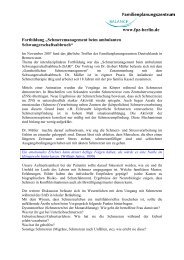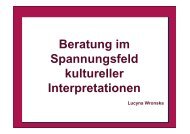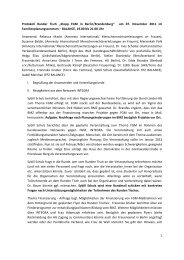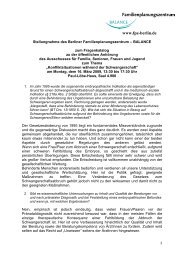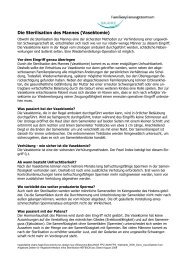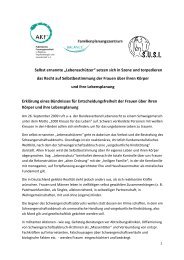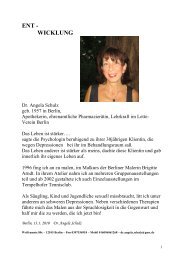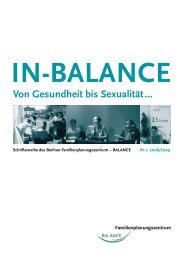Listening to African Voices - FPZ
Listening to African Voices - FPZ
Listening to African Voices - FPZ
You also want an ePaper? Increase the reach of your titles
YUMPU automatically turns print PDFs into web optimized ePapers that Google loves.
that FGM/C had been carried out in their family. Half of thewomen interviewed reported <strong>to</strong> have undergone FGM/Cwhile three women said they had not. The question was notposed by the researchers <strong>to</strong> the remaining two women.The participants claimed <strong>to</strong> be parents of 18 daughters, 13 ofthem living in Germany. None of the girls living in Hamburghad undergone FGM/C, but two daughters who had grownup in Mali had been subjected <strong>to</strong> the practice. According <strong>to</strong>the responses of the parents, none of the daughters living inHamburg was at risk.A minority of seven participants considered FGM/C <strong>to</strong> be areligious practice. The greater part of the participants (27)were informed that FGM/C was not allowed in Germanyand pronounced themselves against its continuation. Theremaining 12 persons were ambiguous about whether or notFGM/C should continue. It seemed like they accepted theidea of s<strong>to</strong>pping FGM/C while living in Europe, but that theywere in favour of its continuation in their country of originand some men were quite intimidating <strong>to</strong>wards the researchers.“There might be a law prohibiting female circumcisionhere, but we can still continue our traditions in Africa.”(man of Malian origin)“My sister, be careful with the interviews. Whatever yourtradition is, it is what gives you an identity. And we cannever change our traditions. Being circumcised is part ofwho you are.” (man of Malian origin)Among the women participants, there were two strongadvocates for the abandonment of the practice. The firstwoman comes from a practicing family while the secondwoman has not undergone FGM/C:“Female circumcision must be considered a crime becauseit makes a woman suffer and can make her unhappy allher life. She suffers from pain during intercourse, fromhaemorrhage after getting circumcised, and then thereare problems at delivery; 90% of obstetrical fistulaeare due <strong>to</strong> female circumcision. It can even cost lives.”(woman of Malian origin)“Female circumcision is a crime and has <strong>to</strong> be condemnedby all means and the culprits should receive the samejudgement as murderers. Their saying that female circumcisionreduces the sexual desire of the woman is notbased on reality. I have not been circumcised, but I canlive more than five years without having sexual intercourse.”(woman of Malian origin)5.6.3. TanzaniaThe community from Tanzania is only 42 head strong with anequal proportion of women and men. The FGM/C prevalencefor the country is 15%. The practice is most widespread inthe Western and Northern regions (Dodoma, Arusha, Singidaand Manyara (41-81% prevalence).We interviewed three women and four men from Tanzania,but none of them were from families in which FGM/C wasstill practiced. None of them could provide significant informationon the <strong>to</strong>pic.5.6.4. Eritrea, Sudan, SomaliaThe immigrants from Eritrea, Sudan and Somalia in Hamburgare few, but have in common that they come from countrieswith FGM/C prevalence rates above 85%. We reached only16 participants from these countries as well as one keyinformant from Eritrea and one from Somalia. The educationlevel of the participants was high (an average of 15 years offormal education).All but one of the women interviewed had undergoneFGM/C. The practice had been carried out in their countryof origin by traditional practitioners. The non-circumcisedwoman was born in Germany and had never been <strong>to</strong> hercountry of origin.The participants had a <strong>to</strong>tal of four daughters, but none ofthem had been subjected <strong>to</strong> the practice and the parentsexpressed no intention <strong>to</strong> do so in the future.All but one participant were in favour of the abandonmen<strong>to</strong>f the practice; only one man from Eritrea reported beingunsure as he considered that he did not have enough informationon the <strong>to</strong>pic <strong>to</strong> make a decision.5.7. Girls at risk in HamburgThe current section aims at exploring several questions:• Is FGM/C practiced in Hamburg (and in other parts ofGermany)?• Are girls of <strong>African</strong> origin who grow up in Hamburg at riskof being subjected <strong>to</strong> FGM/C outside Germany?• What are the risk fac<strong>to</strong>rs and protective fac<strong>to</strong>rs (fac<strong>to</strong>rsthat help ensure protection) for girls from practicingfamilies?• Are girls with one European and one <strong>African</strong> parent(from a practicing family) at risk of being subjected <strong>to</strong> thepractice?76<strong>Listening</strong> <strong>to</strong> <strong>African</strong> <strong>Voices</strong>






